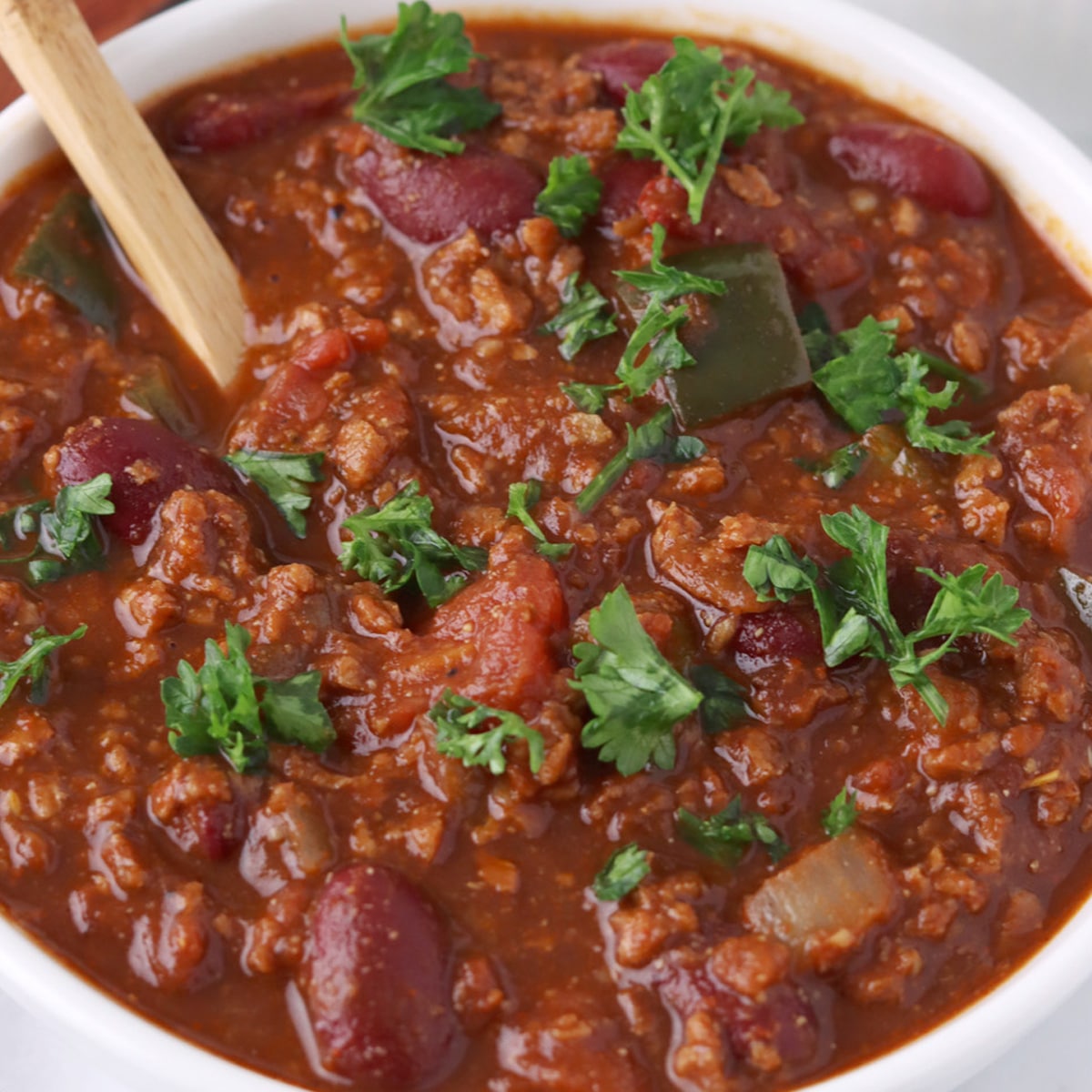Legumes are a significant source of protein and are one of six food groups needed for a balanced vegan diet.
This article reviews the nutrition and health benefits of legumes while offering tips and recipes to incorporate more legumes into your plant-based diet.
Jump to:
What are Legumes?
Legumes are the protein-rich seed or fruit from a family of plants called Fabaceae. They grow in pods and these pods may or may not be eaten.
The term legume refers to:
- Soybeans
- Peanuts
- Fresh peas
- Fresh beans
- Pulses
Pulses are any legume where the seeds inside the pod are dried. They can be purchased dried or pre-cooked in cans.
Pulses include:
- Chickpeas
- Lentils (all types)
- Dry peas (including split peas)
- Dry beans (including black beans, kidney beans)
When people discuss legumes, they often focus on soybeans and pulses.
Despite peanuts being legumes, they are often classified as nuts due to their nutrient composition. Similarly, fresh peas and green beans are typically grouped as a vegetable.
Other High Protein Vegan Foods
High protein foods, including legumes, form one of six food group for vegan diets. While legumes provide high protein content, other foods to include in this food group are:
- Seitan (made from wheat gluten)
- Textured vegetable protein (made from soy)
- Soy curls
- Nutritional yeast
Additional protein sources for vegan diets come primarily from grains or nuts and seeds. These sources help vegans meet their overall protein needs on a plant-based diet.
Health Benefits of Legumes
Plenty of research has explored the health benefits of legumes and pulses. Overall, legume consumption has been linked to heart health, appetite control and weight management and blood sugar regulation.
In addition to the health benefits of legumes discussed below, legumes are also high in fiber which offers additional benefits.
Legumes and Heart Health
Legumes have the potential to lower total and LDL cholesterol levels. LDL cholesterol is commonly referred to as “bad” cholesterol. It is the type of cholesterol linked to heart disease 1.
Research also shows legume consumption is associated with lower blood pressure 2, 3.
The direct impact of legume consumption on cardiovascular outcomes appears more moderate, despite legume consumption being correlated with improved cholesterol and blood pressure 4.
Legumes for Appetite
Studies have examined if legumes can help moderate appetite and the results suggest they can 5.
One study found that adding legumes to a meal led to reduced food consumption at the next meal 6. In addition, lower blood sugars after the second meal were found for two of the three test groups 6.
Observational studies have linked legume consumption, including soy, with lower body mass index (a ratio of height to weight) 7, 8. Legume consumption is also associated with lower waist circumference, a measurement linked to cardiovascular disease risk 9.
Legumes and Blood Sugar
Legume consumption appears to help regulate blood sugars. Diets high in legumes, with or without a low-glycemic or high-fiber diet pattern, were found to lower two measures of blood sugar 10.
Additionally, the 2018 Diabetes Canada clinical practice guidelines suggest that dietary patterns emphasizing pulses can be considered in people with type 2 diabetes to improve blood sugar control 11.
Research on whether legume consumption helps prevent development of type 2 diabetes is mixed 12.
Nutrition Content of Legumes
Legumes are a fantastic plant-based source of:
- Protein, including the amino acid lysine
- Fiber
- Iron
- Zinc
- Magnesium
- Folate
- Phosphorous
- Selenium
Soybeans and soy products have a different composition compared to other legumes, specifically pulses. While pulses are quite low in fat, soybeans (and peanuts) are much higher in fat. In addition to the nutrient list above, soybeans also provide:
- Omega 3 fatty acids
- Vitamin E
- Calcium (tofu, fortified soy beverage)
Why Should Vegans Eat Legumes?
Legumes are an excellent source of protein for vegans. Specifically, they are a great source of the amino acid lysine.
Lysine may be challenging to consume enough of on a vegan diet. Therefore, it’s generally recommended to consume multiple servings per day of high lysine foods. Legumes are a high lysine food.
Additionally, consuming legumes as part of a vegan diet can help meet intake needs for essential minerals, particularly iron and zinc.
Soybeans and soy products are particularly helpful to include in a vegan diet as they offer a great source of healthy fats. Tofu is also a great source of calcium (make sure “calcium” appears in the ingredient list), which can be a challenging nutrient to consume in adequate amounts as a vegan.
Eating legumes can be an easy and delicious approach to meeting nutrient needs on a vegan diet. Legumes are also budget-friendly, making them an affordable staple of plant-based eating.
Legumes to Include in a Vegan Diet
You can include any legume in a vegan diet. Some great legumes to add to your plant-based diet are:
- Chickpeas (garbanzo beans)
- Black beans (turtle beans)
- Soybeans
- Brown lentils
- Red lentils
- Yellow lentils
- Navy beans
- Pinto beans
- Yellow split peas
- Green split peas
- Mung beans
- Pink beans
- Kidney beans
- White kidney beans
- White beans
- Fava beans
- Great northern beans
- Black-eyed peas
- Adzuki beans
In addition, there are plenty of soy foods to include in a plant-based diet:
- Tofu
- Tempeh
- Soy beverage (soy milk)
- Edamame
- Soy nuts
- Textured soy protein (textured vegetable protein/ TVP)
- Soy curls
- Soy yogurt
Other soy products like soy sauce, tamari and miso paste are good flavoring options, but don’t provide significant amounts of protein or the nutrients listed above. This is mainly because you'll only consume these ingredients in small quantities.
There are also meat alternatives and other high protein foods (listed above) to include in a balanced vegan diet as well.
How to Eat More Legumes as a Vegan
Legumes are very easy to add to almost any meal or snack. Here are my top tips for incorporating more legumes into your vegan diet:
- Keep Canned Legumes in the Pantry: Always keep a few cans of your favorite legumes on hand. In a pinch, just drain and rinse them, then add to any meal.
- Add Legumes to Salads: Tired of boring salads that don’t fill you up? Add some cooked legumes! You can roast them until they’re crunchy, creating a fantastic topping for salads (and soups). Grilled tofu or tempeh are great for salads or grain bowls.
- Add Legumes to Soups and Stews: You can cook soaked legumes directly into a soup, add canned legumes or, for creamy soups, blend some legumes into the mix! White beans or soft tofu work well for blending.
- Learn How to Cook with Tofu/ Tempeh: These two soy products are a fantastic starting point for any meal. Tofu has a mild flavor and can be seasoned to taste like just about anything! Check out the recipes below for inspiration.
- Snack on Legumes: Cooked edamame, roasted chickpeas and soy nuts all make for a filling and tasty plant-based snack.
- Use Lentils as a Ground Meat Substitute: In many recipes that call for ground meat, lentils can be used in place of the meat. If you’re vegan, use lentil to recreate previously enjoyed ground meat recipes!
- Blend Tofu into Sauces: Tofu can blend easily into creamy sauces, soups, salad dressings and even smoothies. This is a great way to increase your legume intake while enjoying a creamy texture! Soft tofu is best for blending.
- Try Out Cultural Foods that Feature Legumes: Legumes are a staple ingredient for different cuisines around the world. Just search for legume recipes from any region/ country and get exploring!
- Start your Day with Legumes: You may not think about legumes as a breakfast food, but they easily can be. From tofu scramble, baked beans on toast, hummus toast (like avocado toast), lentil pancakes or soft tofu blended in a smoothie, there’s plenty of ways to include legumes in your morning meal.
Recipes Using Legumes
Legumes are one of my favorite ingredients and they are a staple in my diet! Here’s some delicious recipe using legumes.
Recipes with Beans, Lentils and Chickpeas
-
Vegan TVP Chili Recipe (High Protein)
-
Vegan Sushi Bake Recipe (with Chickpea “Tuna”)
-
Vegan Chickpea Patties Recipe (Gluten Free)
-
Red Lentil Tortilla Wraps Recipe
Recipes with Tofu and Tempeh
-
Teriyaki Tempeh Recipe (with Homemade Sauce)
-
Vegan Raspberry Cheesecake Recipe
-
Vegan Orange Chicken Recipe
-
Green Curry with Tofu
Summary: Legumes for Vegans
Legumes are one of six food groups for a balanced vegan diet. They are packed with nutrition and offer an excellent source of plant-based protein.
In addition, research shows that legumes have many positive health benefits including associations with improved heart health, appetite control and blood sugars.
There’s a huge variety of legumes to try and countless ways to incorporate more legumes into a vegan diet!
Always speak with a doctor before changing your diet or taking new supplements. Please read our full website disclaimer.

About Nicole Stevens
Nicole is a long-time vegan with a Masters of Science in Food and Nutrition.
She helps people thrive on a vegan diet with balanced recipes.









Reply to comment